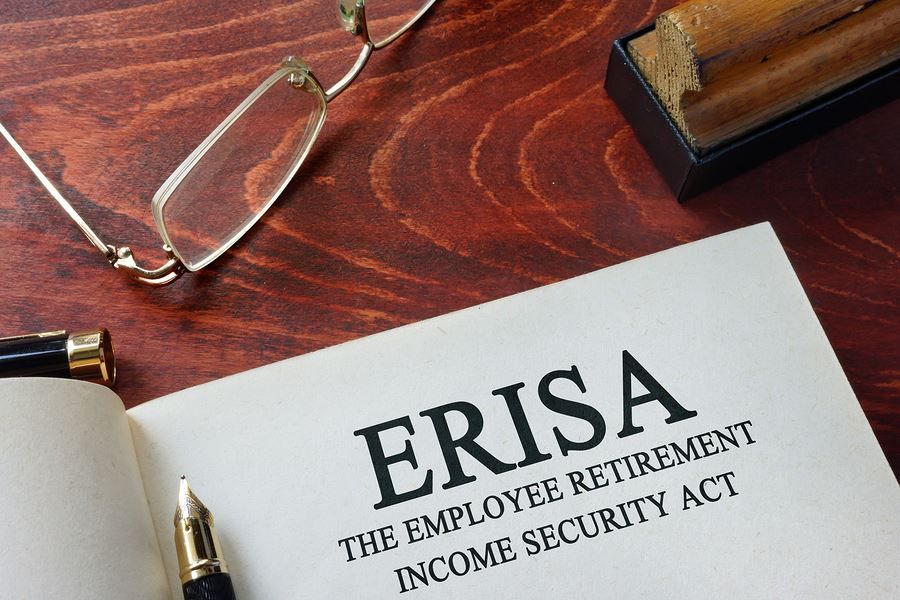ERISA stands for the Employee Retirement Income Security Act of 1974. It is a piece of federal legislation that governs employer-provided benefit plans. It sets up minimum standards that employers must adhere to when they offer their employees benefits. These standards include:
- Informing employees of their benefits packages
- Requiring that insurance providers and administrators follow strict policies for managing employee benefits
- Employees may receive legal recourse through federal court
What Is an ERISA Plan?
Not all benefits plans that employees purchase will be subject to ERISA. ERISA exclusively covers benefits plans purchased through private employers. It is important to note that the term ‘private employer’ includes non-profit organizations and charities. Government employees and employees of religious institutions are not covered by ERISA, however.
Which Plans Are Subject to ERISA?
ERISA applies to two major types of plans. ERISA covers traditional pension plans. ERISA also covers plans considered to be “welfare benefits.” This type of plan includes benefits like the following:
- Short-term disability insurance
- Long-term disability insurance
- Health insurance
- Life insurance
- Unemployment benefits
- Vacation benefits
- Severance benefits
Which Plans Are Not Subject to ERISA?
Some benefits like worker’s compensation or state-mandated disability plans are not protected by ERISA. The following list includes more benefits an employer may offer which are not covered by ERISA:
- Tuition-reimbursement
- Cafeteria plans
- Payroll practice plans
- Safe Harbor plans
- Adoption assistance
- Tax-deferred compensation plans
- Bonus plans
How Does ERISA Help Me?
If your benefit plan is subject to ERISA, you have extra protections if your initial claim gets denied. ERISA allows you 180 days to file a denied claim appeal. However, this appeal will go to federal court where it will have to obey specific processes.
You will want to consult with an experienced ERISA attorney before beginning this process. This is because you will not be able to submit new evidence or documentation if your case goes to court. Additionally, a federal judge, not a jury, will make the final ruling. It is important that your appeal is comprehensive and complete before filing.
Contact a San Francisco ERISA Attorney From Our Firm to Learn More
The goal of ERISA is to protect employee benefits from mismanagement. Even so, filing and winning a claim can be difficult. This is because the law tends to favor insurance companies. They are usually able to deny claims with no repercussions.
Further, since ERISA is a federal law, ERISA claims are subject to specific procedures. Filing a claim, introducing evidence, and negotiating are best done by an experienced ERISA attorney.
Our San Francisco ERISA attorneys have extensive experience fighting for ERISA-protected workers’ benefits. For those struggling to secure their benefits, we encourage you to contact us today. We offer free consultations which you can schedule here or by phone at (888) 910-3980.
RELATED POSTS




CONTACT US FOR A FREE CASE EVALUATION
You Won't Pay Until We Win
Contact Us
We will get back to you as soon as possible.
Please try again later.
I Feel Lucky to Have Found Them.
“David is so committed to working for and achieving successful outcomes for his clients. I could not recommend them highly enough and feel very lucky to have found them.”
- Shelia H.
Amazingly Dedicated!
“I cannot imagine having had a better experience with an attorney than working with David and his staff from DL Law Group. They were not only professional and responsive, but highly competent.”
- Gisella C.
DL Law Delivers.
“I was extremely impressed with the quality of service, follow-through, knowledge, skill, and approach.”
- Joshua D.
Highly Recommended.
“Knowledgeable, responsive, and professional. They'll get you the settlement you need. Highly recommended.”
- Maureen K.
We Are Grateful
“We would highly recommend DL Law to anyone, and will not hesitate to work with them again when the time comes for a second home or a new house.”
- Gavin C.
I Feel Lucky to Have Found Them.
“David is so committed to working for and achieving successful outcomes for his clients. I could not recommend them highly enough and feel very lucky to have found them.”
- Shelia H.
Amazingly Dedicated!
“I cannot imagine having had a better experience with an attorney than working with David and his staff from DL Law Group. They were not only professional and responsive, but highly competent.”
- Gisella C.
DL Law Delivers.
“I was extremely impressed with the quality of service, follow-through, knowledge, skill, and approach.”
- Joshua D.
Highly Recommended.
“Knowledgeable, responsive, and professional. They'll get you the settlement you need. Highly recommended.”
- Maureen K.
We Are Grateful
“We would highly recommend DL Law to anyone, and will not hesitate to work with them again when the time comes for a second home or a new house.”
- Gavin C.
Local Office
345 Franklin Street
San Francisco, CA 94102
Map & Directions [+]
Quick Links
Helpful Links
Local Office
345 Franklin Street
San Francisco, CA 94102
Map & Directions [+]
Quick Links
The information on this website is for general information purposes only. Nothing on this site should be taken as legal advice for any individual case or situation. This information is not intended to create, and receipt or viewing does not constitute, an attorney-client relationship.
All Rights Reserved.

